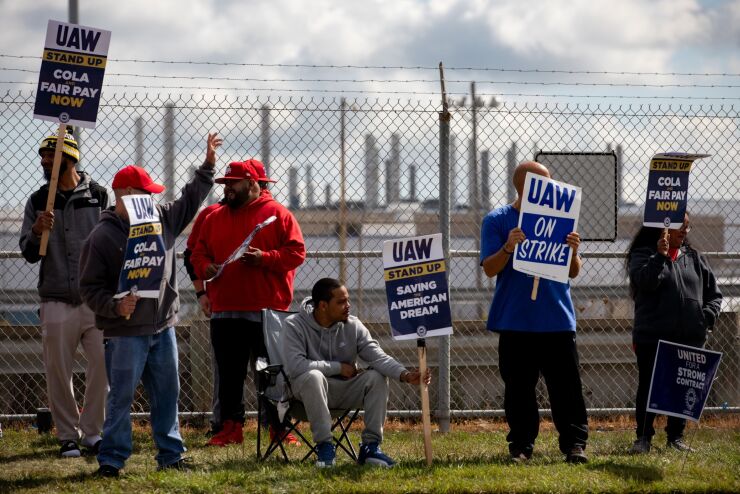The United Auto Workers' strike against three big U.S. automakers, even if successful, won't do much to reduce Michigan's reliance on traditional gasoline-powered vehicles, a report released this week by Moody's Investors Service says.
Rather, the strike "spotlights the carbon transition exposure facing Michigan, Detroit, and certain other local governments in the state as automakers shift to electric vehicles."
Although the strike shouldn't "have significant adverse revenue consequences for Michigan or its local governments, it nevertheless highlights longer-term challenges for a state that is still disproportionately exposed to the domestic auto and auto parts industries," the report says.
Factories in Michigan face a growing risk of being phased out as electric vehicles gain popularity and factories to construct them are built outside of Michigan, the rating agency said.

"Our report will still be relevant even if the strike ends tomorrow, because it just highlights Michigan's exposure to this carbon transition risk, which really comes from its reliance on traditional combustion engine motor vehicle manufacturing and parts," Ted Hampton, Moody's vice president and senior credit officer, told The Bond Buyer. "It will make it harder for the state to hold onto its share of the auto manufacturing industry."
Michigan has far and away the largest share of UAW members among U.S. states, according to Moody's, with 47%. The next largest is Ohio at 12%, while no other state has more than 10%.
But over the past 20 years or so auto employment in Michigan has shrunk by more than 40% while more than doubling in Alabama, gaining more than 50% in South Carolina, and about 20% in Tennessee.
That's largely due two things: The explosive growth in EV production, led by Tesla, and the growth in foreign-owned plants in mostly southern states, where many workers are not unionized.
Importantly, "Michigan has no Tesla presence and Tesla is the major competitor in this new version of the auto industry," Hampton noted. "And its plants are not unionized."
While the auto industry's share of GDP in Michigan is down sharply since the turn of the century, it's still much higher than the U.S. as a whole.
In 2021, the industry's share of state GDP was more than 6%, down by more than half since 2000, compared to less than 1% for the nation.
"Depending on the strike's duration and outcome, the labor stoppage could impede the state's efforts to keep its hold on the U.S. auto industry — and the jobs and tax revenue it produces — as the EV transition accelerates," the Moody's report said.
On a positive note, "the strike is unlikely to have significant adverse revenue consequences for Michigan or its local governments" in the near term, Moody's said. "Lost wages will likely be offset by strike pay from the union's $825 million strike fund, as well as post-strike bonuses and wage hikes. The impact on other state revenue sources, such as sales taxes and levies on businesses, also should be modest."
In a July 5 report on the state's finances, which Moody's rates Aa1, the rating agency said Michigan "faces both the risk of further manufacturing base erosion and the potential to outperform economically if it becomes a hub for EVs, battery cells and related technology."
While Michigan "appears to have had a significant amount of success in bringing EV-related projects to the state that would be economically beneficial over the long term," Hampton said, "it's important to note that EVs don't need as many human employees."





